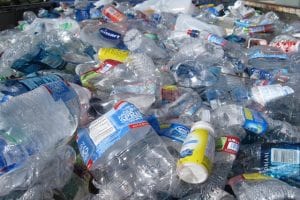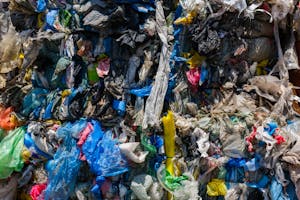June 30, 2025

Researchers at Louisiana State University have developed a promising new method to recycle plastic more efficiently and affordably. The innovative process leverages electromagnetic induction heating combined with magnetic catalysts to break down commercial plastics in a way that’s far less energy-intensive than traditional methods.
The approach has the potential to significantly reshape how the industry handles plastic waste, aligning environmental responsibility with financial opportunity and providing a path forward for more scalable, sustainable plastic recycling operations.
At the center of this breakthrough is the novel use of electromagnetic induction heating, which allows plastics to be melted from the inside out. This innovative internal heating method significantly lowers the energy required for processing compared to conventional pyrolysis, which depends on sustained high temperatures and tends to generate large amounts of greenhouse gases, particularly carbon dioxide and hydrogen.
The LSU-developed process incorporates specialized magnetic materials and tailored catalysts that enable precise control over molecular breakdown. This level of control makes it possible to preserve high-value monomers such as ethylene and propylene during the recycling phase, which are compounds that serve as foundational inputs for new polymer production and represent billions in global market value.
Perhaps most importantly from a practical standpoint, the method is tolerant of common contaminants, including food residue, which often renders plastics unsuitable for standard recycling.
The global market for ethylene alone is valued at an estimated $150 billion, representing a major financial incentive for processes that can recover this essential building block during recycling.
LSU’s method does exactly that, with the added benefit of capturing other valuable monomers such as propylene, further expanding the potential return on investment for operators who integrate chemical recovery into their workflows. The technology also reduces energy consumption by heating plastics internally rather than externally, which sharply cuts operating costs.
Compared to traditional pyrolysis, the process generates far fewer byproducts, including significantly lower levels of methane and carbon dioxide, offering both environmental and regulatory advantages.
Through the reclaiming of high-value compounds from plastic waste, companies have a clear opportunity to develop new revenue streams while reducing raw material dependence and boosting overall efficiency.

The recycling process developed by LSU researchers offers clear integration benefits for industrial facilities, as it is designed to work within the framework of existing operations with minimal infrastructure modification. This compatibility allows manufacturers and recyclers to adopt the technology without significant capital disruption.
This novel process also addresses several persistent challenges in the recycling chain. The method performs well with mixed or contaminated plastic inputs, including materials tainted with food residue, which are typically discarded under current systems. The process produces less operational waste and enables better emissions control, helping facilities meet tightening environmental standards.
Compared to pyrolysis, this approach functions at lower temperatures and delivers a cleaner end product, making it a more efficient and adaptable option for large-scale plastic processing.
Recovering valuable monomers like ethylene and propylene from plastic waste introduces a meaningful opportunity to reduce reliance on fossil fuel-derived feedstocks. Instead of sourcing new raw materials through traditional cracking of oil and natural gas, manufacturers can reclaim what’s already in circulation, decreasing exposure to price volatility and supply chain disruptions.
The process effectively transforms discarded plastic into a profitable input, opening the door for recyclers and producers to generate revenue from what has historically been a cost center. Over time, the combination of reduced material expenses, energy savings, and improved compliance with environmental regulations supports a strong case for long-term return on investment across multiple points in the value chain.
Initial testing suggests this technology can be integrated into standard processing systems without major reconfiguration, making it a viable option for facilities looking to upgrade without extensive capital investment.
Equipment needs are relatively modest, as the system relies on electromagnetic induction components that can complement existing plastic handling setups. A phased adoption model, beginning with targeted pilot programs, would allow operators to assess performance and refine workflows before scaling.
Considerations such as maintenance schedules, throughput capacity, and employee training requirements are already part of ongoing development, with early results pointing to manageable adjustments within current industrial environments.
The recycling process is currently patent pending, with LSU’s Office of Innovation & Technology Commercialization actively guiding its path toward market readiness and future licensing opportunities.
As with any early-stage technology, scaling from laboratory success to full industrial deployment presents challenges, particularly around throughput and system optimization.
However, consistent lab performance and early interest from potential commercialization partners signal strong momentum. Given its low-emission profile and reduced byproduct output, the method is well-positioned for a smooth path through environmental compliance and regulatory approval processes.

Early adopters of this technology stand to gain a clear first-mover advantage in the emerging market of sustainable chemical recovery. Integrating a clean, energy-efficient recycling method offers operational benefits along with the potential to strengthen brand identity and meet increasingly important ESG commitments.
Executives considering forward-looking strategies may find value in pursuing partnerships or pilot collaborations, which could provide early access to intellectual property and an opportunity to help shape the direction and scale of future deployments.
Plastic recycling is entering a new phase where technological innovation can directly impact both the bottom line and long-term sustainability goals. LSU’s process introduces a practical, scalable way to reclaim high-value chemicals from discarded materials, cutting waste and energy use while opening up profitable new supply streams.
For executives looking to stay competitive, access to the latest breakthroughs isn’t optional; it’s strategic. PLASTICS, the Plastics Industry Association, offers direct insights into emerging technologies similar to LSU’s, along with exclusive opportunities to connect with research teams, pilot initiatives, and commercialization partners.
Membership with PLASTICS gives your organization a seat at the table where the future of plastic recycling is being built. Join today to stay at the very forefront of everything that’s happening in the broader plastics industry.
PLASTICS and the Future Leaders in Plastics (FLiP) Committee are devoted to supporting and encouraging the next generation of plastics leaders who will play a crucial role in the innovation, technology and future of the plastics industry. FLiP’s mission is to provide young professionals under the age of 40 the exposure, education and resources they need to build lifelong careers in plastics. Want to join? Want to get your employees involved? Email: [email protected]